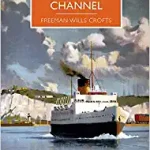Freeman Wills Crofts was one of the major writers during the Golden Age of Detective Fiction in Britain. He was once called “The King of Detective Story” and recognized as one of the big four of Golden Age crime authors. Crofts began writing in the 1920s, and many consider him a pioneer of police procedurals. He wrote over thirty-four novels.
Born in 1879, his father of the same name, Freeman Wills Crofts, was a surgeon-lieutenant in the British Army Medical Service. He died in Honduras of fever before his son was born. Crofts’s mother later married Venerable Jonathan Harding, who later became the Archdeacon of Dromore. Crofts grew up in the vicarage of Gilford. He married Mary Bellas Canning in 1912 and became an engineer for the railroad. They had no children.
Crofts’s Writing Career
In 1919, during a work absence because of an illness, he wrote his first novel, The Cask, to relieve his boredom. Published in 1920, The Cask sold over 100, 000 copies in just a few years. After that, he wrote nearly a book a year, including many short stories and plays, until his death in 1957.
Crofts continued working as an engineer until 1929, when he quit to write full time. He and his wife settled in the village of Blackheath, near Guildford, in Surrey, where many of his stories are located.
Many of his stories included a railroad theme. (Abiding by the write-what-you-know rule.) He became known for using the intricacies of railroad timelines to create apparently unbreakable alibies.
Unlike most of the authors of the time, Crofts focused more on creating an intricate plot than on character or theme. (I guess, better using the mind of the engineer.) His crimes and their solutions showed great detail.
One critic said of Croft, “No living writer is so honestly realistic about the awful tedium of routine police work.”
Inspector French
Freeman Wills Crofts’s most popular character was Inspector Joseph French. The inspector appeared in twenty-nine novels and several short stories between 1924 and 1957. He first appeared in the 1924 novel, Inspector French’s Greatest Case. (Which is a poor choice for a title for the first in a series.)
French worked for the Scotland Yard. He used methodical police work, what today would be old school, to break complex alibies. Over the course of the series, he was promoted to Chief Inspector and later to Superintendent.
The books centered on his work, with little said about his outside life. In Mystery In The Channel, worked closely with other policemen in London and the coast of France.
Crofts wrote of his creation:
“He’s decent, and he’s straight and he’s as kindly as his job will allow. He believes that is you treat people decently—you’ll be able to get more out of them… Politeness is an obsession with him, and he has well earned his nickname of ‘Soapy Joe’. He’s far from perfect, but I’ve known him now for many years, and I don’t wish for a better friend.
“But I have to admit that he’s not very brilliant; in fact, many people call him dull. And here I’ll have to let you into secret history. Anyone about to perpetuate a detective novel must first decide whether his detective is to be brilliant and ‘a character’, or a mere humdrum personality. When French came into being, there seemed two good reasons for making him the second of these. One was that it represented a new departure. There were already plenty of ‘character detectives’, the lineal descendants, most of them, of the great Sherlock. The other reason was much more important. Striking characteristics, consistently depicted, are hard to do.”
Reputation
Freeman Wills Crofts not only gained popularity with great sales, but many contemporary authors also appreciated his work. He was a member of the Detection Club. A group of British mystery writers formed the club in 1930 that included Agatha Christie, Dorothy L. Sayers, and Hugh Walpole. Their first president was G. K. Chesterton.
In 1939, he was elected a fellow of the Royal Society of Arts.
In her Partners in Crime collection of Short Stories, published in 1929, Agatha Christie included a parody of Inspector French alongside her own Hercule Poirot. Raymond Chandler described him as “the soundest builder of them all when he didn’t get too fancy.” (Simple Act Of Murder)
Freeman Willis Crofts One of the leading mystery authors of the Golden Age. @TimSuddeth @OpeningaMystery #mystery Share on XBritish Library Crime Classics

The novel I read, Mystery In The Channel, was a part of the British Library Crime Classics series. Overtime, many of the crime novels from the Golden Age have gone out of print. Tastes and publishers change. Readers and mystery lovers were in danger of losing the ability to read many of the novels that built the foundation for crime fiction.
The British Library publishing arm began reissuing classics that had gone out of print. In 2013, the British library recruited novelist and crime fiction historian Martin Edwards, and he suggested doing a full series of reprints. The British Library Crime Classics launched in 2014. In 2015, Poisoned Pen brought the line to America.
Over 100 books have become part of the series. British Library publisher John Lee and Edwards select books based on quality and “to provide a balanced series representing different decades, story types, and authors.”
Through the actions of groups like this, we are able to learn how crime fiction has developed through the generations. And we can continue to enjoy the stories that earlier readers enjoyed.